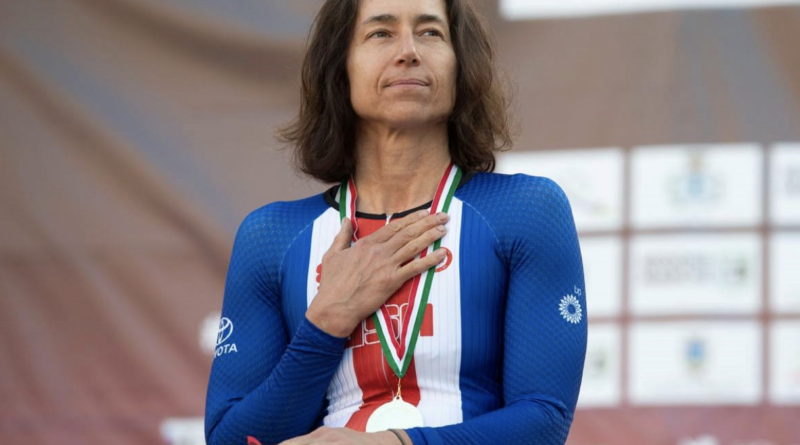A Bronze to the Cyclist from Putney!
By Kevin O’Connor/VtDigger
Vermont cyclist Alicia Dana won a bronze medal Wednesday at the Tokyo Paralympics.
The 52-year-old Putney resident — Vermont’s sole representative to the postponed 2020 Summer Games — placed third in the women’s H1-4 road race after covering the 26.4-kilometer course in 56:24, the U.S. Olympic and Paralympic Committee reported.
Growing up, Dana was an avid cyclist and cross-country skier when, falling from a tree at age 17, she was paralyzed from the waist down. [See our story on her from 2015 Alicia Dana: Paracyling’s World Phenom]
“It changed my life,” she said, “but it is who I am.”
Dana graduated from Marlboro College and the Rhode Island School of Design before discovering the sport of hand-powered cycling. Making her first U.S. Paralympics national team in 2001, she went on to raise a daughter, Willa, before winning overall World Cup titles in 2015 and 2017.
Dana figured medaling at age 47 at the 2016 Rio games was a shiny way to cap a Paralympic career.
“I don’t really think at this point I’ll be aiming for Tokyo in 2020,” she told reporters at the time.
Then Dana won gold at the 2019 World Championship as the U.S. Olympic Committee renamed itself the U.S. Olympic and Paralympic Committee to give equal weight to the latter competition.
“It used to be that Paralympians would earn about one-tenth of what Olympians did, and they changed that to be the same,” she said. “How could I resist a tenfold increase in possible earnings if I just hung in there?”
Dana had to wait an additional year when the Covid-19 pandemic delayed the games. But she recently flew some 6,700 miles to Tokyo for the event now taking place through Sept. 5.
Dana credits her physical training on local roads and, in the winter, a stationary bicycle in her garage. But as tennis-playing Olympic torchbearer Naomi Osaka and gold-medal gymnast Simone Biles can attest, athletes must care for their mental health, too.
“It’s more openly talked about, which I think is great,” Dana said. “It’s an equally important part of any competitive sport.”
A cool head comes in handy, for example, when drivers shout as she’s riding on the roadside.
“A lot of people don’t get it — they see somebody who’s different and they feel they have to tell me I’m doing something wrong,” she said. “People need to open their eyes and minds and understand this is an adaptive sport, and we deserve the same respect as other cyclists.”
Dana received plenty of that in Tokyo.
“It’s really quite amazing to be in this group of people from all parts of the world with all different types of physical disabilities,” she said. “There’s a great deal of camaraderie because we’re all dealing with the same issues. More than just the sport, this is a culture and social network.”
Dana competed in the women’s WH3 class time trial Aug. 31 and road race Sept. . But even before she took to the start, she already claimed a victory.
“As an able-bodied teenager, my dream was to be a pro cyclist, and here I am, 36 years later, competitive at the top level of my field,” she said. “It’s kind of crazy to think about how it all worked out.”

